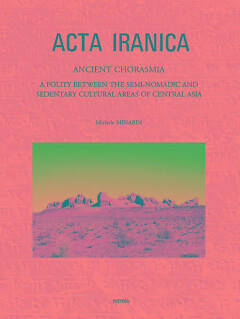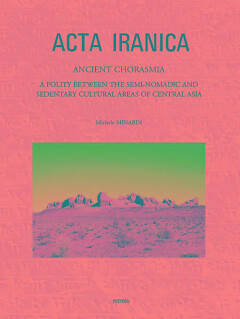
- Afhalen na 1 uur in een winkel met voorraad
- Gratis thuislevering in België vanaf € 30
- Ruim aanbod met 7 miljoen producten
- Afhalen na 1 uur in een winkel met voorraad
- Gratis thuislevering in België vanaf € 30
- Ruim aanbod met 7 miljoen producten
Zoeken
Ancient Chorasmia
A Polity Between the Semi-Nomadic and Sedentary Cultural Areas of Central Asia. Cultural Interactions and Local Developments from the Sixth Century BC to the First Century Ad
M Minardi
€ 94,00
+ 188 punten
Omschrijving
Ancient Chorasmia was a polity which belonged to the Indo-Iranian cultural koine of Central Asia. It was situated at the northern borders of these territories surrounded by deserts, thus relatively isolated as an oasis during its long history. After the pioneering work of Soviet archaeologist S.P. Tolstov and colleagues in the region (correspondent with parts of today's Turkmenistan and Uzbekistan), the polity has been neglected and since then the idea of its cultural isolation in the frame of Central Asian antiquity acknowledged by scholars. But the history of this ancient Persian nation is a history of exchanges and interrelations, closely related with the social and cultural development of the whole Central Asian region and of the Eurasian Steppes. This book is centred on the study of these external relations and considers their impact on the inner development of the polity during a time span of ca. six centuries. The chosen timeframe corresponds with the period beginning with the emergence of true settled civilisation in Ancient Chorasmia - with its integration in the Achaemenid sphere of influence - and ends with the expansion of the Kushan Empire in Central Asia - after the advance of the Hellenistic civilisation. This volume presents new hypotheses on the historical position of Chorasmia within Central Asia, challenging the current established chronology which needed to be revisited in the light of the most recent scholarly and field works on the subject.
Specificaties
Betrokkenen
- Auteur(s):
- Uitgeverij:
Inhoud
- Aantal bladzijden:
- 213
- Taal:
- Engels
- Reeks:
- Reeksnummer:
- nr. 56
Eigenschappen
- Productcode (EAN):
- 9789042931381
- Verschijningsdatum:
- 31/12/2015
- Uitvoering:
- Hardcover
- Formaat:
- Genaaid
- Afmetingen:
- 231 mm x 312 mm
- Gewicht:
- 1270 g

Alleen bij Standaard Boekhandel
+ 188 punten op je klantenkaart van Standaard Boekhandel
Beoordelingen
We publiceren alleen reviews die voldoen aan de voorwaarden voor reviews. Bekijk onze voorwaarden voor reviews.











